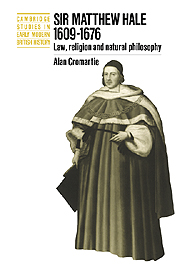Book contents
- Frontmatter
- Contents
- Acknowledgements
- Introduction: a summary life
- Part I Law
- 1 Coke: the appeal to reason
- 2 Selden: the appeal to contract
- 3 The rights of the Crown
- 4 Interregnum
- 5 Protectorate
- 6 Restoration: ‘the nature of laws’
- 7 Restoration: constitutional theory
- 8 Restoration: legal practice
- Part II Religion
- Part III Natural philosophy
- Conclusion
- Appendix: Hale and witchcraft
- Bibliography
- Index
- Titles in the series
3 - The rights of the Crown
Published online by Cambridge University Press: 05 May 2010
- Frontmatter
- Contents
- Acknowledgements
- Introduction: a summary life
- Part I Law
- 1 Coke: the appeal to reason
- 2 Selden: the appeal to contract
- 3 The rights of the Crown
- 4 Interregnum
- 5 Protectorate
- 6 Restoration: ‘the nature of laws’
- 7 Restoration: constitutional theory
- 8 Restoration: legal practice
- Part II Religion
- Part III Natural philosophy
- Conclusion
- Appendix: Hale and witchcraft
- Bibliography
- Index
- Titles in the series
Summary
Hale entered Lincoln's Inn on 18 May 1629. The date is quite important; less than two months before, Charles had dissolved his parliament and imprisoned the more militant among its leadership. Hale missed, in other words, the constitutional troubles of the 1620s, the experience which must have shaped most of his older friends. Of his previous life we know little, except that his background was puritan and that he had spent time at Magdalen Hall. His contemporary biographer Gilbert Burnet (1643–1715) says that it was an accident which brought him into law. He had business with a barrister named Glanville, who was astounded by his legal grasp and persuaded him to train for the profession. The name deserves a moment's pause, for John Glanville (1586–1661) was a member of a not uncommon type, a committed constitutionalist who was later to fight for the king. The progression had a logic which this chapter will explore.
Hale's work can best be understood as a synthesis of Selden's thought with Coke's, but it seems at least worth mentioning his known professional friends. A surprising early patron was the enigmatic turncoat William Noy (d. 1634), a 1620s constitutionalist who became Attorney-General during an early period of King Charles' Personal Rule (1631–34). In the time at which Hale would have known him, he was a leading government hard-liner and an ally of Archbishop Laud's.
- Type
- Chapter
- Information
- Sir Matthew Hale, 1609–1676Law, Religion and Natural Philosophy, pp. 42 - 57Publisher: Cambridge University PressPrint publication year: 1995
- 1
- Cited by



